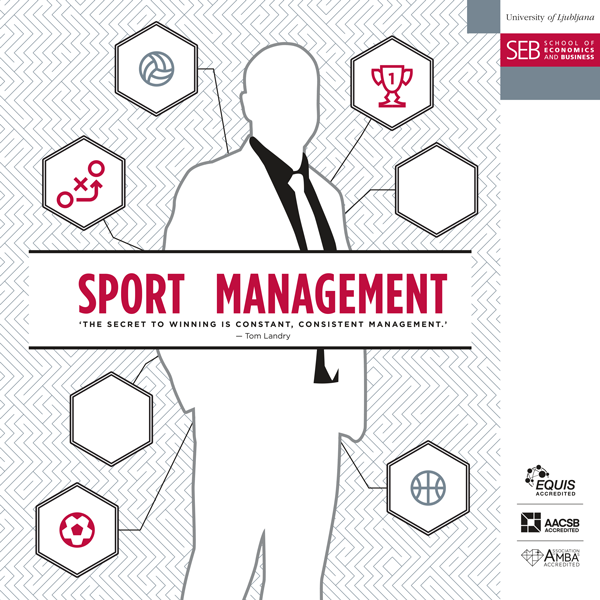Sport Management
About the programme
Sport is more than just a game—it can also be a way of life, and often a big business. In the Sport Management master's programme at the School of Business and Economics and the Faculty of Sport, you will build key competencies in the areas of managing sports organizations, developing strategies in sports organisations, managing sports facilities and sports events, dealing with people in sports organisations, financing sports organisations, marketing in sports, etc. which will help you solve the most complex managerial challenges in business practice.
We make sure that you:
- acquire up-to-date knowledge in a carefully designed programme structure
- gain valuable practical experience and skills
- build a valuable professional network
- create a good basis for employment
Programme structure
The unique value of the programme lies in its carefully designed structure with the aim to balance in-class knowledge about the relevant concepts on one hand and practical experience on the other hand. Students acquire up-to-date knowledge during three sets of courses where each set is delivered in approximately one semester:
- The first set enables students to understand general managerial, organisational, legal, sociological, and psychological issues of sport.
- The second set comprises one methodological course (on qualitative and quantitative research methods) plus a set of courses on three key business functions which are important in every sport organisation: HRM, marketing, and finance.
- The third set is about more specific topics on strategy development in sport organisations as well as managing sport infrastructure and events.
Practical experience and skills
The practical experience of students is partly achieved by including experienced guest lecturers from different sport organisations (e.g. the National Olympic Committee, the Sport Directorate of the Republic of Slovenia, and even UEFA) in the programme.
Most of the practical experience, however, is gained with students participating in the course called Research-Consulting Project in a Sport Organisation. Every year, a different project topic is defined by a selected sport organisation (the client) and the programme director. The client usually defines the initial practical problem based on which the structure of the project is agreed upon, paying attention to both practical applicability as well as research soundness and rigour. The project team is coordinated by at least one academic mentor whose role is to structure and steer the work of students. By working in teams and dealing with specific research questions, students develop analytical skills, acquaint themselves with research and consulting work, and gain valuable practical experience. The presentation of the project to the client’s top management significantly increases students’ motivation and positively influences the development of their written and oral presentation skills.
Professional network
Studying in a small group of students does not just enable a more personalised approach by professors but also creates strong friendships for life. On the other hand, study activities take place on the same premises and the same campus as all other SEB LU’s master's programmes, which enables the students of this programme to be surrounded by hundreds of other SEB LU’s postgraduate students. These are not only Slovenian students but also incoming students from over 70 different countries and over 200 partner institutions from all over the globe. Therefore, the SEB LU offers plenty of opportunities for building a valuable international professional network.
Employment
Graduates of the Sport Management master's programme are employed in various leading positions in for-profit and non-for-profit sports and other organisations in Slovenia and abroad. They work as sports directors, strategic analysts and planners, sports event managers, sports facility managers, managers/agents of athletes, business consultants, marketing experts, human resources experts, technology and product developers in sports and other organisations, etc. They also establish and run their own companies that offer sports products and services or are related to sports in some other way.
| Duration of study | 2 years (4 semesters) |
| Scope of ECTS | 120 ECTS |
| Study status | part-time |
| Degree | Master of Arts (MA) |
Courselist
1st year| Semester | Course | ECTS |
| 1st | Management in Sport | 10 |
| 1st | Ethical and Social Issues in Sport | 6 |
| 1st | Organizational and Legal Issues in Sport | 8 |
| 1st | Research Methodology | 6 |
| 2nd | Human Resource Management in Sport | 8 |
| 2nd | Marketing in Sport | 8 |
| 2nd | Finance and Accounting in Sport | 8 |
| 2nd | *Agency, Networks and Support Systems in Sport | 6 |
| 2nd | *Sport and Media | 6 |
2nd year
| Semester | Course | ECTS |
| 3rd | Strategic Management in Sport | 8 |
| 3rd | Management of Sport Facilities | 6 |
| 3rd | Management of Sport Events | 6 |
| 3rd | Research-Consulting Project in a Sport Organization | 10 |
| 4th | **ELECTIVE COURSE | 6 |
| 4th | MASTER THESIS | 24 |
* Student selects one of the two offered courses. There is the possibility of circular implementation every two years.
** Students may choose any elective course within the SEB LU or any other higher education institution which is properly accredited and has at least 6 ECTS and it is a course within second cycle programme. The list of possible electives will be published at the beginning of the academic year.








